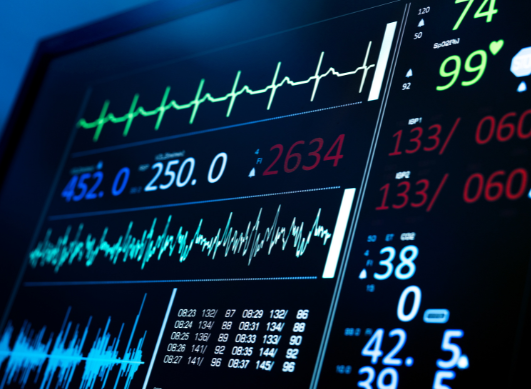Premature Ventricular Contractions (PVCs): Everything you need to know!
Published Jun 1, 2024 • By Somya Pokharna
The heart is a remarkable machine, ticking away with a steady rhythm that keeps life flowing. But sometimes, it can skip a beat – literally. These irregular heartbeats, also known as heart palpitations and premature ventricular contractions (PVCs), are like little hiccups in the heart's rhythm. While they may seem like cause for concern, PVCs are often harmless and can occur in even the healthiest individuals.
But what causes these palpitations? Should you worry about every little flutter in your chest? When should you seek medical attention?
Jump into this article to find the answers!

What are premature ventricular contractions (PVCs)?
PVCs are extra heartbeats that disrupt the heart's normal, steady rhythm. They happen when an electrical signal comes from somewhere in the heart other than its natural pacemaker, the sino-atrial node.
The sino-atrial node, located in the right atrium, usually sets the heart's rate and rhythm by sending electrical signals that make the upper heart chambers (atria) contract. These signals then travel to the atrioventricular (AV) node, which is in the lower part of the heart's wall between the atria. From the AV node, the signals move through the heart's conduction system, reaching the ventricular muscles and causing them to contract. This whole system is controlled by nerves and hormones, which adjust the heartbeat based on activities, stress, and excitement.
PVCs are classified as a type of cardiac arrhythmia in medicine. They are also known as skipped heartbeats, extrasystoles, palpitations, or "heart hiccups." Typically, the PVCs themselves are barely noticeable or only faintly perceptible. However, it is the following regular heartbeat, which happens later and stronger, that creates the sensation of a skipped heartbeat. This feeling can cause concern for the individual experiencing it, leading them to worry about potential underlying heart problems.
What causes premature ventricular contractions?
There are several potential causes and risk factors that can increase a person's likelihood of experiencing PVCs.
Electrical disturbances
The heart's electrical conduction system is responsible for coordinating the rhythmic contractions of the heart muscle. Any disturbance or abnormality in this electrical system can lead to premature electrical impulses, resulting in premature heartbeats. These electrical disturbances can be caused by factors such as electrolyte imbalances, or certain medications, such as the following:
- Amphetamines used for conditions like ADHD.
- Albuterol used in inhalers for asthma and other respiratory conditions.
- Digoxin, used to treat heart failure and arrhythmias.
- Flecainide and Amiodarone, used to treat various types of arrhythmias.
- Tricyclic Antidepressants like amitriptyline and nortriptyline.
- Selective Serotonin Reuptake Inhibitors (SSRIs), such as fluoxetine and sertraline, though less common.
- Clozapine, used for schizophrenia and other psychiatric disorders.
- Haloperidol, used to treat schizophrenia and acute psychosis.
- Diphenhydramine, found in many over-the-counter allergy and sleep medications.
- Pseudoephedrine, found in many over-the-counter cold and flu medications.
Underlying heart conditions
Certain heart conditions, such as coronary artery disease, heart failure, cardiomyopathy, or valvular heart disease, can increase the risk of premature heartbeats. These conditions can cause structural or functional changes in the heart, leading to abnormal electrical conduction and premature contractions.
Increased stress or anxiety
Emotional stress and anxiety can trigger the release of hormones like adrenaline and cortisol, which can affect the heart's electrical activity and lead to premature heartbeats. Stressful situations or emotional upheavals can increase the likelihood of experiencing PVCs.
Electrolyte imbalances
Electrolytes like potassium, sodium, and calcium play a crucial role in the electrical conduction of the heart. Imbalances in these electrolyte levels, either due to an underlying medical condition or certain medications, can disrupt the heart's electrical activity and cause premature heartbeats.
Caffeine and stimulant intake
Consuming excessive amounts of caffeine or other stimulants can temporarily increase heart rate and may cause premature heartbeats in some individuals. These substances can heighten the excitability of the heart's electrical system, leading to irregular contractions.
Smoking and nicotine
Nicotine, found in tobacco products, is a stimulant that can have a direct effect on the heart's electrical activity. Smoking and nicotine use are associated with an increased risk of premature heartbeats and other heart rhythm disturbances.
Alcohol consumption
Excessive alcohol consumption can lead to dehydration and electrolyte imbalances, which can contribute to the development of premature heartbeats, particularly in individuals with underlying heart conditions.
What are the signs and symptoms of premature ventricular contractions?
The main signs and symptoms of PVCs or premature heartbeats include:
- Feeling of an irregular, stronger, or "skipped" heartbeat
- Palpitations or awareness of a change in heart rate/rhythm
- Sensation of the heart beating hard or pounding in the chest/throat
- Feelings of anxiety, panic, or trepidation
- Sweating
- Chest pain
- Shortness of breath or feeling of respiratory distress
- Stomach upset or increased urge to urinate
- Headache or nausea
- Dizziness or near-fainting (syncope)
- Fatigue
How can premature ventricular contractions be diagnosed?
PVCs are often diagnosed incidentally during routine ECG examinations, which can easily identify and record the premature heartbeats.
If PVCs are suspected but not conclusively diagnosed by a resting ECG, the doctor may recommend wearing a Holter monitor for a period of time, typically 24–48 hours. This portable device continuously records the heart's electrical activity during normal daily activities and at rest, providing a more comprehensive evaluation of the heart's rhythm and the frequency of PVCs.
In some cases, the doctor may order a cardiac stress test, which involves performing an ECG while the patient engages in physical activity of increasing intensity, such as walking or running on a treadmill. This test can help determine if PVCs occur during exercise or periods of increased physical exertion, which may indicate an underlying condition.
How are premature ventricular contractions treated?
In general, treatment is not necessary for asymptomatic or infrequent PVCs in otherwise healthy individuals. However, if they are frequent, symptomatic, or associated with underlying heart disease, treatment may be required and range from exercise to surgical interventions:
- Exercise has been shown to help reduce the frequency of PVCs.
- Reducing alcohol consumption and smoking.
- Managing stress through relaxation techniques.
- Getting adequate sleep.
- Maintaining a healthy diet and avoiding stimulants like caffeine.
- Taking mineral supplements such as magnesium and potassium to help counteract palpitations (but only under medical supervision).
- Using beta-blockers (e.g., atenolol, metoprolol) to stabilize heart rhythm.
- Going on anti-anxiety medications to manage stress.
- If medications are ineffective or not suitable due to side effects, radio frequency catheter ablation can be performed, which involves using heat (radio frequency) energy to create tiny scars in the heart and block irregular electrical signals causing PVCs.
- Pacemaker implantation may be necessary in severe cases or if PVCs are caused by an underlying cardiac condition.
Was this article helpful to you?
Give it a "Like" and share your thoughts and questions with the community in the comments below!
Take care!
Sources:
Evaluation and Management of Premature Ventricular Complexes | Circulation | American Heart Association
Fish, F. A., Kannankeril, P. J., & Johns, J. A. (2011). Disorders of Cardiac Rhythm. Elsevier EBooks, 338–363.
Khashayar Farzam, & Richards, J. R. (2023, August 8). Premature Ventricular Contraction. Nih.gov; StatPearls Publishing.
Klewer, J., Springer, J., & Morshedzadeh, J. (2022). Premature Ventricular Contractions (PVCs): A Narrative Review. The American journal of medicine, 135(11), 1300–1305.
Merino, L. (2024). Frequent ventricular extrasystoles: significance, prognosis and treatment. Escardio.org, 9(17).
Premature Ventricular Contractions (PVCs) and Premature Atrial Contractions (PACs) | Frankel Cardiovascular Center | Michigan Medicine. (2023).
Premature ventricular contractions (PVCs) - Symptoms & causes - Mayo Clinic
Premature Ventricular Contractions (PVCs): Symptoms & Causes | NewYork-Presbyterian
Premature Ventricular Contractions | Cedars-Sinai
Premature ventricular contractions: Reassure or refer? | Cleveland Clinic Journal of Medicine
Comments
You will also like

What are the dangers associated with the over-the-counter sale of certain medicines?
Dec 19, 2020 • 6 comments

 Facebook
Facebook Twitter
Twitter

